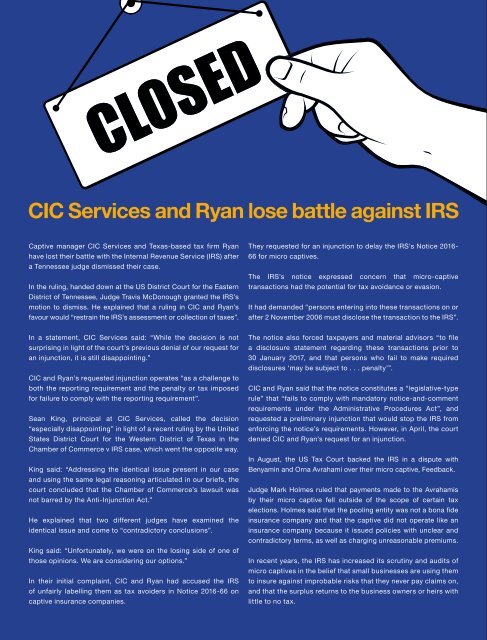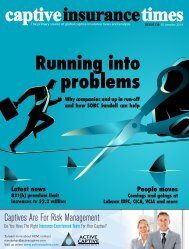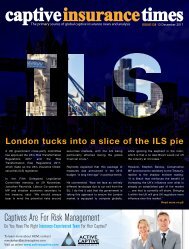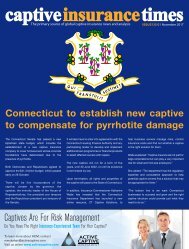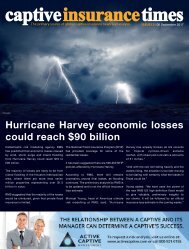Captive Insurance Times issue 136
Inside this issue of Captive Insurance Times, find out what industry experts predict the potential opportunities and challenges will be for the captive industry in 2018. Phillip Giles of QBE North America provides his thoughts on future opportunities for the healthcare sector. Also, history shows that it is difficult to predict when interest rates will change and when markets will rise or fall, which, according to Stephen Nedwicki of Comerica Bank, is even more reason to maintain a disciplined approach to your investments.
Inside this issue of Captive Insurance Times, find out what industry experts predict the potential opportunities and challenges will be for the captive industry in 2018.
Phillip Giles of QBE North America provides his thoughts on future opportunities for the healthcare sector.
Also, history shows that it is difficult to predict when interest rates will change and when markets will rise or fall, which, according to Stephen Nedwicki of Comerica Bank, is even more reason to maintain a disciplined approach to your investments.
You also want an ePaper? Increase the reach of your titles
YUMPU automatically turns print PDFs into web optimized ePapers that Google loves.
CIC Services and Ryan lose battle against IRS<br />
<strong>Captive</strong> manager CIC Services and Texas-based tax firm Ryan<br />
have lost their battle with the Internal Revenue Service (IRS) after<br />
a Tennessee judge dismissed their case.<br />
In the ruling, handed down at the US District Court for the Eastern<br />
District of Tennessee, Judge Travis McDonough granted the IRS’s<br />
motion to dismiss. He explained that a ruling in CIC and Ryan’s<br />
favour would “restrain the IRS’s assessment or collection of taxes”.<br />
They requested for an injunction to delay the IRS’s Notice 2016-<br />
66 for micro captives.<br />
The IRS’s notice expressed concern that micro-captive<br />
transactions had the potential for tax avoidance or evasion.<br />
It had demanded “persons entering into these transactions on or<br />
after 2 November 2006 must disclose the transaction to the IRS”.<br />
In a statement, CIC Services said: “While the decision is not<br />
surprising in light of the court’s previous denial of our request for<br />
an injunction, it is still disappointing.”<br />
CIC and Ryan’s requested injunction operates “as a challenge to<br />
both the reporting requirement and the penalty or tax imposed<br />
for failure to comply with the reporting requirement”.<br />
Sean King, principal at CIC Services, called the decision<br />
“especially disappointing” in light of a recent ruling by the United<br />
States District Court for the Western District of Texas in the<br />
Chamber of Commerce v IRS case, which went the opposite way.<br />
King said: “Addressing the identical <strong>issue</strong> present in our case<br />
and using the same legal reasoning articulated in our briefs, the<br />
court concluded that the Chamber of Commerce’s lawsuit was<br />
not barred by the Anti-Injunction Act.”<br />
He explained that two different judges have examined the<br />
identical <strong>issue</strong> and come to “contradictory conclusions”.<br />
King said: “Unfortunately, we were on the losing side of one of<br />
those opinions. We are considering our options.”<br />
In their initial complaint, CIC and Ryan had accused the IRS<br />
of unfairly labelling them as tax avoiders in Notice 2016-66 on<br />
captive insurance companies.<br />
The notice also forced taxpayers and material advisors “to file<br />
a disclosure statement regarding these transactions prior to<br />
30 January 2017, and that persons who fail to make required<br />
disclosures ‘may be subject to . . . penalty’”.<br />
CIC and Ryan said that the notice constitutes a “legislative-type<br />
rule” that “fails to comply with mandatory notice-and-comment<br />
requirements under the Administrative Procedures Act”, and<br />
requested a preliminary injunction that would stop the IRS from<br />
enforcing the notice’s requirements. However, in April, the court<br />
denied CIC and Ryan’s request for an injunction.<br />
In August, the US Tax Court backed the IRS in a dispute with<br />
Benyamin and Orna Avrahami over their micro captive, Feedback.<br />
Judge Mark Holmes ruled that payments made to the Avrahamis<br />
by their micro captive fell outside of the scope of certain tax<br />
elections. Holmes said that the pooling entity was not a bona fide<br />
insurance company and that the captive did not operate like an<br />
insurance company because it <strong>issue</strong>d policies with unclear and<br />
contradictory terms, as well as charging unreasonable premiums.<br />
In recent years, the IRS has increased its scrutiny and audits of<br />
micro captives in the belief that small businesses are using them<br />
to insure against improbable risks that they never pay claims on,<br />
and that the surplus returns to the business owners or heirs with<br />
little to no tax.


